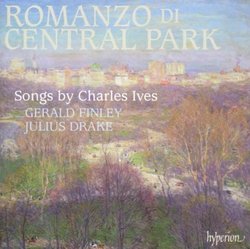Songs by Charles Ives
Robin Friedman | Washington, D.C. United States | 03/13/2008
(4 out of 5 stars)
"In 1922, the great American composer Charles Ives (1874 -- 1954) gathered together many of the songs he had composed and had them privately published, together with his commentary, as a book, called simply "114 songs". The songs were arranged in reverse chronological order, with the more recently composed works appearing first in the volume. Among his other accomplishments, Ives deserves recognition as an American master of the art song.
The songs are short and widely disparate in mood and style. Many of the songs, especially those composed by a young Ives, show his indebtedness to German romanticism and to the songs of Schubert and Schumann. The latter songs show Ives at his most modern and iconoclastic. The songs cover a wide variety of subjects as well, including childhood and nostalgia for lost innocence, religious revivalism, love of America, family, romance, and much else. Ives himself wrote the lyrics for many of his songs, and he often used texts written by his wife, Harmony Twitchell Ives (1874-1979) as well. Ives frequently took the themes of his songs from longer works and, conversely, transferred material from the songs into his more ambitious compositions. As he does throughout his music, Ives borrowed liberally in his songs, quoting from gospel and revival hymns, from American popular music, and from classical composers.
In 2005, the Canadian baritone Gerald Finney and pianist Julius Drake recorded an outstanding collection of Ives's songs titled, "A Song -- for Anything"; and this 2008 recording of 30 additional Ives songs "Romanzo di Central Park" is a worthy follow-up. It was difficult for me to give this recording only four stars. But the songs are mixed, and some of them are of relatively lesser interest. Then too, Ives's songs differ from his other, longer works in which, at his best, Ives combined traditionalist romantic composition with the wildest flights of fancy. Due to their small compass, the songs tend to fall on one side of the line or the other with little of the juxtaposition of different styles that characterize the larger works.
With their varied styles and themes, there are many lovely moments in Finley's and Drake's second effort with the Ives songs. The highlights of the early songs include "Slow March", perhaps Ives's earliest composition, with lyrics written by himself, which is about the burial of the family's pet cat. Other notable early songs on this CD include the sentimental "Songs my Mother Taught Me" and the raucous and lively "The Circus Band" also set to Ives's own text.
Some of Ives's best songs explore themes of patriotism. This CD includes Ives's text and music to "They are There!" a song which became famous for the sentiments it expressed on the eve of the United States's entry into WWI. The song "In Flanders Fields" to a text by John McCrae offers a more sobering view of the war experience. Another song with love of country as a theme is "My Native Land" set to a text by Heine.
The more modernistic experimental songs include "Premonitions" with its echoes of musical impressionism, the clangorous song "Watchman", the song "Evening" which at its end quotes the Le-be-wohl" motif from Beetoven's Les Adieux piano sonata, and "The Last Reader", setting a text by the American poet Oliver Wendell Holmes.
Other songs on this CD I enjoyed that fall between early and late Ives include "In the Alley", with flirty and light lyrics by Ives; the charged "Allegro", "At the River" a song based on the famous revival hymn, and the title song for the collection, "Romanzo di Central Park."
This latter song, together with "They are There!" feature a violin obligato.
The CD includes texts for all the songs and translations as well for the efforts Ives made in setting German poems. This CD and its companion are excellent ways to explore the songs of Charles Ives.
Robin Friedman
"


 Track Listings (30) - Disc #1
Track Listings (30) - Disc #1